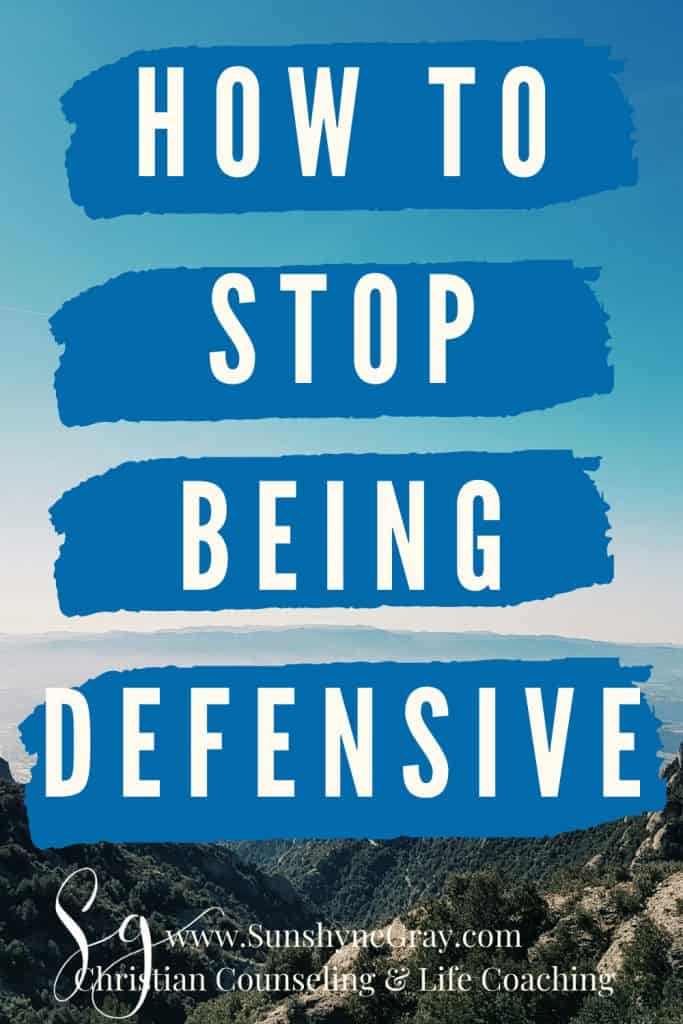How to Stop Being Defensive
Everyone gets defensive sometimes! However, when defensiveness is a pattern it can become destructive. A pattern of defensiveness becomes destructive for both you as an individual and for your relationships. This is why it is so important to know how to stop being defensive. Patterns of defensiveness is an effort to self protect- let’s take a closer look…

Definition of Defensiveness
Defensiveness is both an emotion and an action. We might feel defensive when we perceive someone is being critical towards us. As a result, we act defensively in an effort to self protect. By behaving defensively we can avoid uncomfortable emotions such as shame, fear or hurt.
Examples of Defensiveness
Acting defensively plays out in different ways, such as making excuses or justifying our actions. Another way defensiveness may play out is through blame shifting, which is quite literally shifting blame to another person. Defensiveness can also lead to minimizing someone’s feelings, shutting down the conversation or even diverting focus to past issues to avoid the current issue. These patterns are not God’s best for us, that is why I want you to learn how to stop being defensive.
Cost of Defensiveness
When we behave defensively, it does serve the purpose of protecting ourselves from the criticism in the moment, but does not yield long-term results.
When we experience uncomfortable or negative emotions, such as feeling defensive we tend to do something to escape the pain of those emotions. Consequently, we behave defensively.
Doing so is not good for us as individuals, nor is it good for our relationships. As individuals, defensiveness can keep us from learning and growing. It can also increase isolation and negativity.
Those who disregard discipline despise themselves, but the one who heeds correction gains understanding. Proverbs 15:32
In relationships, problems won’t be solved, rather, the tension and lack of resolution will only grow. Defensiveness can unintentionally make the other person feel bad. The unnecessary pain caused due to patterns of defensiveness is why it is so important to learn how to stop being defensive.
Causes of Defensiveness
After reviewing examples of defensiveness and the cost of this destructive pattern, you were probably wondering, “Why would anyone be defensive?”. But, we all do it at times, some of us more often than others.
So, let’s talk about what causes defensiveness. I believe we get defensive due to the criticism triggering or activating a false core belief we might have about ourselves or others. Consequently, fears and insecurities rise up and we self protect. Sometimes defensiveness is simply a learned pattern that needs to be changed. It’s also possible we don’t want to know or address the truth about ourselves.
Bible Verses about Defensiveness
We want to learn how to stop being defensive because it’s not God‘s best for us. Below are Bible verses about defensiveness…
Jesus is our ultimate example of how to respond to criticism or feedback.
When they hurled their insults at him, he did not retaliate; when he suffered, he made no threats. Instead, he entrusted himself to him who judges justly. 1 Peter 2:23
James gives us a right response; when we are thoughtful and prayerful – responding rather than reacting, we are better positioned to evaluate the criticism.
“My dear brothers and sisters, take note of this: everyone should be quick to listen, slow to speak and slow to become angry,” James 1:19
Sometimes criticisms are made that aren’t fair or true. We can remember that God is fighting for us so we don’t need to resort to destructive patterns of defensiveness.
The Lord will fight for you; you need only to be still. Exodus 14:14
My shield is God Most High, who saves the upright in heart. Psalm 7:10
He says, be still and know that I am God; Psalm 46:10a
How to Stop Being Defensive: Best 7 Tips
1. Practice the Pause
My dear brothers and sisters, take note of this: everyone should be quick to listen, slow to speak and slow to become angry, James 1:19
Just because someone says it, doesn’t make it true. When we practice the pause we make room to think, pray and listen to the Holy Spirit. This allows us time to evaluate what is being said. If there is truth, respond in a way that allows for growth. Often, others can more easily see our blind spots. This is my favorite tip on how to stop being defensive.
2. Don’t Judge Motives
Do not judge, or you too, will be judged. For in the same way you judge others, you will be judged, and with the same measure you use, it will be measured to you. Matthew 7:1-2
We are in no position to judge the hearts of man. That is an attempt to lift God weight. Refrain from judging the motive or heart of the one making the criticism. Focusing on judging motives only distracts from the current issue at hand. Focus on the criticism or feedback and practice the pause so you can evaluate for truth.
3. Don’t Point to the Faults of Others
It (love) does not dishonor others it is not self-seeking, it is not easily angered, it keeps no record of wrongs.
1 Corinthians 13:5b
It can be very tempting to point to another’s faults in an effort to self protect, however nothing good comes from a quickly escalating disagreement. Everyone has weaknesses and shortcomings- pointing that out is not productive or effective when receiving feedback. Wait for another time.
4. Take Responsibility
Whoever conceals their sins does not prosper, but the one who confesses and renounces them finds mercy. Proverbs 28:13
It’s simple, but sometimes difficult. Take responsibility for wrongdoing. Not only is it freeing for you, it’s good for relationships. Confess, seek forgiveness and find freedom!
5. Don’t React
When someone offers criticism, we can become overwhelmed with negative emotions. Remember, everyone has strengths and weaknesses. We all have good days and bad days. Reminding ourselves of this truth is more productive than wallowing in a guilt and shame.
When strong emotions, such as guilt or shame are activated, we tend to become emotion driven. Consequently, when we are emotion driven, we are not logic driven. Beware of letting emotions run the show.
6. Reframe the Criticism
…but grow in the grace and knowledge of our Lord and Savior Jesus Christ. To him be the glory both now and forever! Amen. 2 Peter 3:18
When we view criticism as negative thing, we block it and self protect through defensiveness. However, when we view criticism as an opportunity to grow and transform, we are more likely to welcome it. Feedback can be an invitation to become a better version of yourself.
7. Know Your Value
Consider the ravens: they do not sow or reap, they have no store room or barn; yet God feeds them. And how much more valuable you are than birds! Luke 12:24
In God‘s economy our value is never based on our works. This means our value is not upgraded when we get things right. Nor is it downgraded when we make mistakes. It is important to know this in our core when hearing negative feedback from another person. For a printable list of Scriptures on your value go here.
Wrapping Up: How to Stop Being Defensive
Everyone engages in defensiveness at times. If you notice a pattern of defensiveness, it might be time to ask yourself, “Why am I so defensive?”. There is no benefit to defensiveness – It has a personal cost as well as a high cost for relationships.
Begin practicing a new approach to criticism or feedback. Practice the pause in order to evaluate if the criticism is true. If there is truth, don’t react. Instead, take responsibility, remembering your value and remembering we all make mistakes and that’s okay. View this as an opportunity for growth!


This was a great post. Thank you.
Thanks for stopping by, Anna! Glad it was helpful!
This was a very well written post. It didn’t make me feel defensive at all, about being defensive! I like your writing style. Your examples and tips, especially the scriptures hit home. I really want to make this work 🙂 Thank you and God Bless ????
This is such an insightful article. My son is very defensive when he is challenged about his lifestyle, the fact that he spends most of his time in his room, has no job or purpose and no desire to change. We are at a loss as to how to get his attention
Hi John, You are in a difficult spot- Dr. Cloud and Townsend have a great book on Boundaries- I encourage you to check it out. I also just published an article that might be helpful… https://sunshynegray.com/how-deal-defensiveness-others/
My Ex-husband is extremely defensive. I can as well be at times. But this actually gives me a better understanding, so when I say I want to talk to you about something, and I don’t want you to get upset. I need to stop saying that because it doesn’t help. Until he wants to change, I’m thinking he is going to continue to feel defensive.
It’s true, he is in charge of his reactions/responses, but you can change how you interact with his defensiveness. Check out this article… https://sunshynegray.com/how-deal-defensiveness-others/
Great post
This is so beautiful, I read through with my pen and journal. Hopefully I would be able to integrate the lessons in my daily life. Thank you for sharing.
It is a good post but I don’t know where to start. People make it seem like reading a post is the answer to the lingering problems. I’ve been defensive as far back as I can remember and I’m 62 years old now. I’m a Christian and crying to God for help. Nonetheless, thanks for your suggestions
How do you communicate with someone who is mentally, verbally and emotionally abusive towards you?
I’m dealing with a family member with PTSD and rage. I feel stuck, trying to help him and also trying to protect myself from his abuse.
What a timely post to have included in my Sunday morning devotional study (going the extra mile in/through Christ). May God bless you. Everyone please read (Acts 2:38).
Disregard the question marks. Typing error.
As a new leader of a ministry at my church and approaching new heights in my career, this was so helpful. Thank you and God Bless